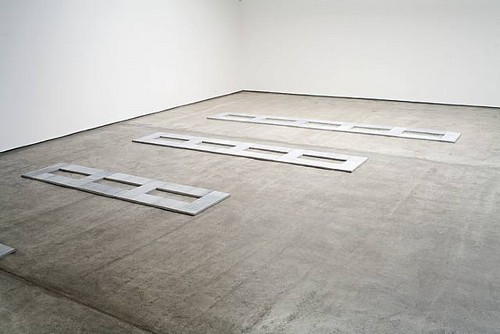Carl Andre
26 Sep - 31 Oct 2009
CARL ANDRE
26. Sep - 31. Okt 2009
NEW YORK – Paula Cooper Gallery is pleased to announce an exhibition of new sculpture by Carl Andre. The exhibition, on view from September 26 through October 24, 2009, will include works made of Belgian Blue limestone and Eastern pine timbers.
Andre’s modular units of prefabricated materials installed in geometric configurations on the floor continue to explore the various relationships between media, space and form. Since the 1960s, Andre has created sculpture that tends to depart from the traditional principles of verticality and monumentality and that also eschews metaphor and symbolism. Through his focus on placement, environment and relativity, Andre’s works call attention to the inherent qualities of the material and the spatial specificity of the sculptural object.
Andre started his career as a sculptor working with wood. In 1958-1959, he was carving wood timbers using a chisel or saw to create abstract pieces with geometric, often symmetrical patterns. These early works recalled both the grace and balance of Brancusi’s sculptures and the rigorous logic of the paintings of Frank Stella, whose studio Andre was sharing at the time. In 1960, Andre started his Elements series, using identical timbers of equal size in various configurations. This series marks the moment when Andre definitively abandoned the alteration of materials. He progressively moved on to materials such as granite, limestone, steel, lead and copper.
Andre’s first one-person show was held in 1965 at the Tibor de Nagy Gallery, New York, and the following year his work was included in Kynaston McShine’s and Lucy Lippard’s seminal exhibition “Primary Structures” at the Jewish Museum. He was, with Donald Judd, Dan Flavin and Sol LeWitt, one of the leading young artists of the 1960s often associated with Minimalism. In the 1970s, the artist created large installations, such as 144 Blocks and Stones (1973) for the Portland Center for the Visual Arts, Oregon, and outdoor works such as Stone Field Sculpture (1977) in downtown Hartford, Conn. and Lament for the Children at P.S.1, New York (1976).
Andre’s work has been the subject of several retrospectives, most notably at the Solomon R. Guggenheim Museum, New York, in 1970; the Laguna Gloria Art Museum, Austin, Texas, in 1978; the Whitechapel Art Gallery, London, in 1978; the Stedelijk Van Abbemuseum, Eindhoven, in 1987; the Haus Lange und Haus Esters, Krefeld; the Kunstmuseum, Wolfsburg, in 1996; and the Musée Cantini, Marseilles, in 1997. He was included in three major surveys highlighting the ongoing reassessment of Minimalism and Conceptual Art’s legacy: “Singular Forms (Sometimes Repeated)” (Guggenheim Museum, 2004); “A Minimal Future? Art as Object 1958-1968” (MOCA Los Angeles, 2004); and “Open Systems: Rethinking Art c. 1970” (Tate Modern, 2005).
26. Sep - 31. Okt 2009
NEW YORK – Paula Cooper Gallery is pleased to announce an exhibition of new sculpture by Carl Andre. The exhibition, on view from September 26 through October 24, 2009, will include works made of Belgian Blue limestone and Eastern pine timbers.
Andre’s modular units of prefabricated materials installed in geometric configurations on the floor continue to explore the various relationships between media, space and form. Since the 1960s, Andre has created sculpture that tends to depart from the traditional principles of verticality and monumentality and that also eschews metaphor and symbolism. Through his focus on placement, environment and relativity, Andre’s works call attention to the inherent qualities of the material and the spatial specificity of the sculptural object.
Andre started his career as a sculptor working with wood. In 1958-1959, he was carving wood timbers using a chisel or saw to create abstract pieces with geometric, often symmetrical patterns. These early works recalled both the grace and balance of Brancusi’s sculptures and the rigorous logic of the paintings of Frank Stella, whose studio Andre was sharing at the time. In 1960, Andre started his Elements series, using identical timbers of equal size in various configurations. This series marks the moment when Andre definitively abandoned the alteration of materials. He progressively moved on to materials such as granite, limestone, steel, lead and copper.
Andre’s first one-person show was held in 1965 at the Tibor de Nagy Gallery, New York, and the following year his work was included in Kynaston McShine’s and Lucy Lippard’s seminal exhibition “Primary Structures” at the Jewish Museum. He was, with Donald Judd, Dan Flavin and Sol LeWitt, one of the leading young artists of the 1960s often associated with Minimalism. In the 1970s, the artist created large installations, such as 144 Blocks and Stones (1973) for the Portland Center for the Visual Arts, Oregon, and outdoor works such as Stone Field Sculpture (1977) in downtown Hartford, Conn. and Lament for the Children at P.S.1, New York (1976).
Andre’s work has been the subject of several retrospectives, most notably at the Solomon R. Guggenheim Museum, New York, in 1970; the Laguna Gloria Art Museum, Austin, Texas, in 1978; the Whitechapel Art Gallery, London, in 1978; the Stedelijk Van Abbemuseum, Eindhoven, in 1987; the Haus Lange und Haus Esters, Krefeld; the Kunstmuseum, Wolfsburg, in 1996; and the Musée Cantini, Marseilles, in 1997. He was included in three major surveys highlighting the ongoing reassessment of Minimalism and Conceptual Art’s legacy: “Singular Forms (Sometimes Repeated)” (Guggenheim Museum, 2004); “A Minimal Future? Art as Object 1958-1968” (MOCA Los Angeles, 2004); and “Open Systems: Rethinking Art c. 1970” (Tate Modern, 2005).

